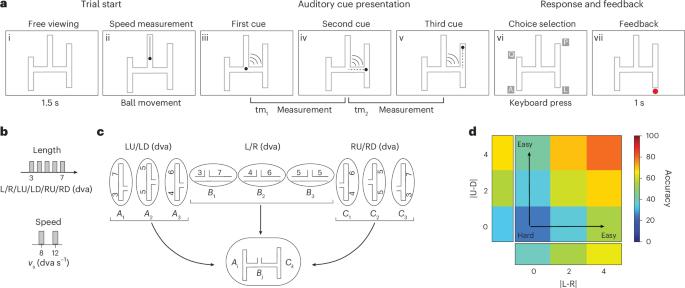Computational basis of hierarchical and counterfactual information processing
IF 15.9
1区 心理学
Q1 MULTIDISCIPLINARY SCIENCES
引用次数: 0
Abstract
Humans solve complex multistage decision problems using hierarchical and counterfactual strategies. Here we designed a task that reliably engages these strategies and conducted hypothesis-driven experiments to identify the computational constraints that give rise to them. We found three key constraints: a bottleneck in parallel processing that promotes hierarchical analysis, a compensatory but capacity-limited counterfactual process, and working memory noise that reduces counterfactual fidelity. To test whether these strategies are computationally rational—that is, optimal given such constraints—we trained recurrent neural networks under systematically varied limitations. Only recurrent neural networks subjected to all three constraints reproduced human-like behaviour. Further analysis revealed that hierarchical, counterfactual and postdictive strategies—typically viewed as distinct—lie along a continuum of rational adaptations. These findings suggest that human decision strategies may emerge from a shared set of computational limitations, offering a unifying framework for understanding the flexibility and efficiency of human cognition. Ramadan et al. examine how humans deploy hierarchical and counterfactual reasoning strategies given cognitive constraints.


分层与反事实信息处理的计算基础
人类使用分层和反事实策略解决复杂的多阶段决策问题。在这里,我们设计了一个可靠地采用这些策略的任务,并进行了假设驱动的实验,以确定产生这些策略的计算约束。我们发现了三个关键的制约因素:促进分层分析的并行处理的瓶颈,补偿性但容量有限的反事实过程,以及降低反事实保真度的工作记忆噪声。为了测试这些策略在计算上是否合理(即在给定这些约束条件下是否最优),我们在系统变化的限制条件下训练循环神经网络。只有受这三种约束的循环神经网络才能重现类似人类的行为。进一步的分析表明,等级策略、反事实策略和事后判断策略——通常被认为是独特的——存在于理性适应的连续体中。这些发现表明,人类的决策策略可能来自一组共享的计算限制,为理解人类认知的灵活性和效率提供了一个统一的框架。
本文章由计算机程序翻译,如有差异,请以英文原文为准。
求助全文
约1分钟内获得全文
求助全文
来源期刊

Nature Human Behaviour
Psychology-Social Psychology
CiteScore
36.80
自引率
1.00%
发文量
227
期刊介绍:
Nature Human Behaviour is a journal that focuses on publishing research of outstanding significance into any aspect of human behavior.The research can cover various areas such as psychological, biological, and social bases of human behavior.It also includes the study of origins, development, and disorders related to human behavior.The primary aim of the journal is to increase the visibility of research in the field and enhance its societal reach and impact.
 求助内容:
求助内容: 应助结果提醒方式:
应助结果提醒方式:


